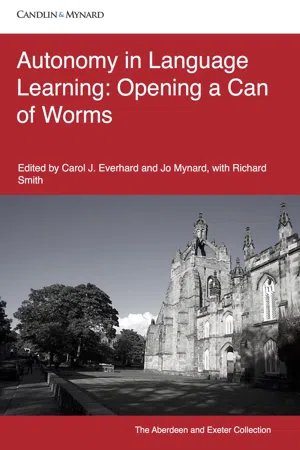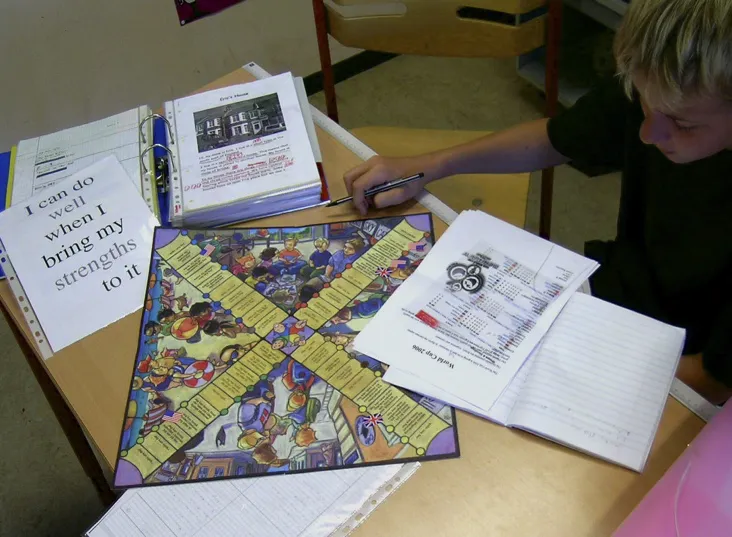
- English
- ePUB (mobile friendly)
- Available on iOS & Android
About this book
?This volume contains a collection of articles which were originally published between 2006 and 2010 in the IATEFL Learner Autonomy SIG ’s newsletter Independence. All of the articles were written in connection with a project which likened exploring the multifaceted concept of learner autonomy to opening a metaphorical “can of worms”. Ten “worms” were released into the academic community, resulting in a series of short articles.The following areas are explored in this collection: Assessment, Classroom research, Counselling / advising, Culture, Learner training, Motivation, Self-access, Teacher autonomy, Teacher education, and Technology. 50 authors contributed to the book and the result is a highly original and, at times, humorous take on aspects of learner autonomy. Despite the light-hearted approach, the contributions are grounded in research and practice and come from a range of countries and contexts, making this an essential resource for anyone interested in the field of language learner autonomy.
?
The book was originally published as an ebook in 2011 by IATEFL. It has now been republished as an ebook and paperback book in the Autonomous Language Learning Series series.
Frequently asked questions
- Essential is ideal for learners and professionals who enjoy exploring a wide range of subjects. Access the Essential Library with 800,000+ trusted titles and best-sellers across business, personal growth, and the humanities. Includes unlimited reading time and Standard Read Aloud voice.
- Complete: Perfect for advanced learners and researchers needing full, unrestricted access. Unlock 1.4M+ books across hundreds of subjects, including academic and specialized titles. The Complete Plan also includes advanced features like Premium Read Aloud and Research Assistant.
Please note we cannot support devices running on iOS 13 and Android 7 or earlier. Learn more about using the app.
Information

Table of contents
- What’s with the Worms?
- Editors’ notes
- About the editors
- Acknowledgements
- Contributing authors
- Introduction by Carol J. Everhard
- Assessment
- 1. Hanne Thomson
- 2. Sanja Wagner
- 3. Viljo Kohonen
- 4. Gina Oxbrow
- Classroom Research
- 5. Lienhard Legenhausen
- 6. Klaus Schwienhorst
- 7. Naoko Aoki
- 8. Dieter Wolff
- 9. Jose Lai
- Counselling / Advising
- 10. Marina Mozzon McPherson
- 11. Sarah Toogood
- 12. Sara Cotterall
- 13. E. Desiree Castillo Zaragoza
- 14. Mia Victori
- 15. Sally Logan and Moira Hobbs
- Culture
- 16. Adrian Holliday
- 17. Bojana Petrić
- 18. B. Kumaravadivelu
- 19. David Palfreyman
- Learner Training
- 20. Barbara Sinclair
- 21. Gail Ellis
- 22. Leni Dam
- Motivation
- 23. Ema Ushioda
- 24. Terry Lamb
- 25. Martin Lamb
- 26. Tim Murphey
- 27. David McLoughlin
- Self-Access
- 28. Richard Pemberton
- 29. Lucy Cooker
- 30. Humberto Cervera Rosado
- 31. Alex Ding
- 32. Anna Gorevanova and Jamilya Gulyamova
- 33. Bruce Morrison
- Teacher Autonomy
- 34. Flávia Vieira
- 35. Isabel Barbosa
- 36. Manuel Jiménez Raya
- 37. Leslie Bobb Wolff
- 38. Flávia Vieira
- Teacher Education
- 39. Leni Dam
- 40. June Miliander
- 41. José Luís Vera Batista
- 42. Anja Burkert
- 43. Frank Lacey
- 44. Leni Dam
- Technology
- 45. Vance Stevens
- 46. Dafne Gonzalez and Rubena St. Louis
- 47. Deborah Healey
- Conclusions by Jo Mynard